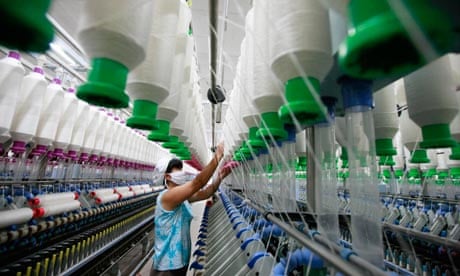Europe's slide back into recession has been blamed for a sluggish return to growth across the manufacturing sectors of Asia's largest economies.
China, South Korea and Taiwan on Monday reported modest increases in sales and orders in March as businesses switched from selling to Europe in favour of exports to the growing US economy.
Only India bucked the trend in the region after months of high inflation and uncertainty over the outcome of regional elections undermined manufacturers' confidence and hit sales.
Delhi, at the centre of Asia's third-largest economy, suffered a third straight month of slower growth in its purchasing managers' index (PMI), dragged down by a decline in orders. Indian businesses were also hesitant after the costs of raw materials showed no signs of falling.
While the index remained above 50, it slipped to 54.7 in March from 56.6 in February. Any figure above 50 indicates expansion.
China's manufacturers have also suffered the after-effects of rising inflation. Government attempts to cool the economy following a prolonged housing boom have included tighter credit controls, which have helped to avoid a hard landing. But the controls brought an end to the stimulus that kept the economy growing at a fast pace in 2010 and 2011. China's economy now appears to be headed for its weakest quarter since early 2009.
Beijing's official PMI hit an 11-month high with a stronger than expected 53.1 for March. But a separate, private survey by HSBC, which focuses more on smaller factories than the large state-owned enterprises captured in the official data, paints a gloomier picture. The index stayed below the 50 mark separating growth from contraction, coming in at 48.3.
"The upside surprise in China's manufacturing PMI is welcome, and should help quell excessive fears of a 'hard landing' in China," said Vishnu Varathan, an economist with Mizuho in Singapore.
"But equally, we should not be lulled into thinking that China has turned a corner either. Global conditions continue to be highly uncertain notwithstanding the stabilisation in Europe and 'green shoots' in the US."
Qinwei Wang, China economist at analysts Capital Economics in London, said the official PMI might be too optimistic.
"The much better performance in the index probably reflects its seasonal strength around this time of the year rather than a significant improvement in conditions for the sector," he said.
"Indeed, the official PMI has never declined in March and the average increase in that month has been 3.2 points since it was first released in 2005 (excluding the latest data). The data are said to have been seasonally adjusted prior to release, but a clear pattern still remains."
HSBC's PMI for South Korea edged up to a one-year high of about 52 in March from February's 50.7, despite a 1.4% decline in exports. In Taiwan, the PMI figures marked the second straight month of improving business conditions and the pace of expansion was the fastest since April 2011.
Increased demand, both domestically and from abroad, supported factory activity in March.







